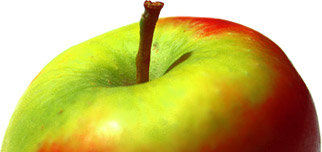Perrine Yellow Transparent is bud-sport (natural mutation) of WhiteTransparent. It has double the number of chromomes (4 instead of 2) found in most apples, and as a result tends to become a fairly large vigorous tree.
The apples are very large, ripen very early (late July), and have a basic acidic flavor which becomes sweeter when fully ripe. They are mainly used for cooking, and the flesh quickly cooks down to a creamy sauce - for cooking purposes it is best to pick the apples when still green.
Like White Transparent, the tree is winter-hardy - down to zone 3. The tree is fairly disease-resistant, but susceptible to fireblight (although perhaps not quite to the extent that White Transparent is).
USDA identification images for Perrine Yellow Transparent
The identification paintings in the USDA Pomological Watercolor Collection span the years 1886 to 1942.
Citation: U.S. Department of Agriculture Pomological Watercolor Collection. Rare and Special Collections, National Agricultural Library, Beltsville, MD 20705.
Sport
This variety is a sport (natural genetic mutation) of: Yellow Transparent
Visitor reviews
Tree register
United States
- George R in Fredericktown, PA
- Jennifer in Centralia, ILLINOIS
- Perrine Anderson in Salt Lake City, UTAH
Spring blossom records for this variety
2015 season
- 1st May 2015 - tree owned by George in Fredericktown, United States
- 15th April 2015 - tree owned by Perrine in Salt Lake City, United States
Record your blossom dates in our Fruit Tree Register - more >>.
Origins
- Species: Malus domestica - Apple
- Parentage: White Transparent
- Originates from: Centralia, Illinois, United States
- Introduced: 1930
- Developed by: D.B. Perrine
- UK National Fruit Collection accession: 1954-054
Identification
- Country of origin: United States
- Fruit colour: Green
Using
- Picking season: Early
- Keeping (of fruit): 1 week
- Flavour quality: Good
- Flavour style (apples): Sharper
- Cooking result: Puree
- Cropping: Good
- Food uses: Culinary
Growing
- Gardening skill: Average
- Flowering group: 2
- Ploidy: Tetraploid
- Vigour: Slightly large
- Self-fertility: Partially self-fertile
Other qualities
- Disease resistance: Average
Where to buy fresh fruit
No orchards have registered as growing this variety. If you grow this and want to register please go to our Orchard Registration form.

